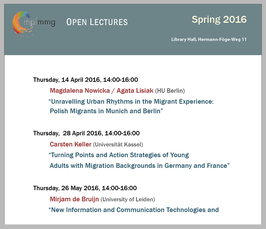"Unravelling urban rhythms in the migrant experience: Polish migrants in Munich and Berlin"
Open Lectures Spring 2016
- Datum: 14.04.2016
- Uhrzeit: 14:00 - 16:00
- Vortragende: Magda Nowicka / Agata Lisiak (HU Berlin)
- Magdalena Nowicka is professor of migration and transnationalism at the Institute of Social Sciences and member in the Berlin Institute for Integration and Migration Research (BIM), both at the Humboldt University. Her current project is “Transforming Migration. Transnational Transfer of Multicultural Habitus” (www.transformig.hu-berlin.de). Her publications include The Ashgate Research Companion to Cosmopolitanism (edited with Maria Rovisco, Ashgate 2011) and numerous articles and book chapters on conviviality, cosmopolitanism and migrant transnationalism. Agata Lisiak is postdoctoral researcher at Humboldt University’s Institute of Social Sciences and lecturer at Bard College Berlin. She is the author of Urban Cultures in (Post)Colonial Central Europe (Purdue University Press 2010), as well as articles and book chapters on media representations of the city, cultural memory, gender and migration, and everyday life in the city. Her current research project is entitled “Immigrant Mothers as Agents of Change”.
- Ort: MPI-MMG, Hermann-Föge-Weg 11, Göttingen
- Raum: Library Hall

For more details please contact buethe(at)mmg.mpg.de.
The study of migration and the study of urban life have been closely linked since the emergence of the social sciences as organized disciplines. Ethnicity remains at the center of the wide body of work on cities and migration, regardless of the research foci: it persists, among others, in studies on urban multiculturalism and diversity, segregation and social inequality in cities, and opportunity structures for migrants in cities. Consequently, migrants’ understandings and usages of urban space, as well as their interactions therein, are often explained in terms of ethnic and cultural categories. Whereas we recognize that ethnicity is relevant for people in how they relate to each other in various situations, we think that analyses that present migrants’ urban experiences as being solely mediated by ethnic belonging, obscure other important factors at play. Inspired by Doreen Massey (1994), we consider urban places as being open, porous and interlinked and, culturally complex. Drawing from the rich tradition of feminist geography, we examine the different ways in which women experience and make sense of work relations in urban contexts (Johnson 1994; 2008; McDowell 1993; Yeoh and Ramdas 2014; Wright 2010). We address these by analyzing Polish female migrants’ narratives of everyday practices related to professional work and childrearing in Berlin and Munich. In our talk, we will discuss gendered performances in various types of places in the city – the workplace, home and in public space broadly understood. We will pay attention hereby to the workings of neoliberalism, and neoliberal time regimes in particular.